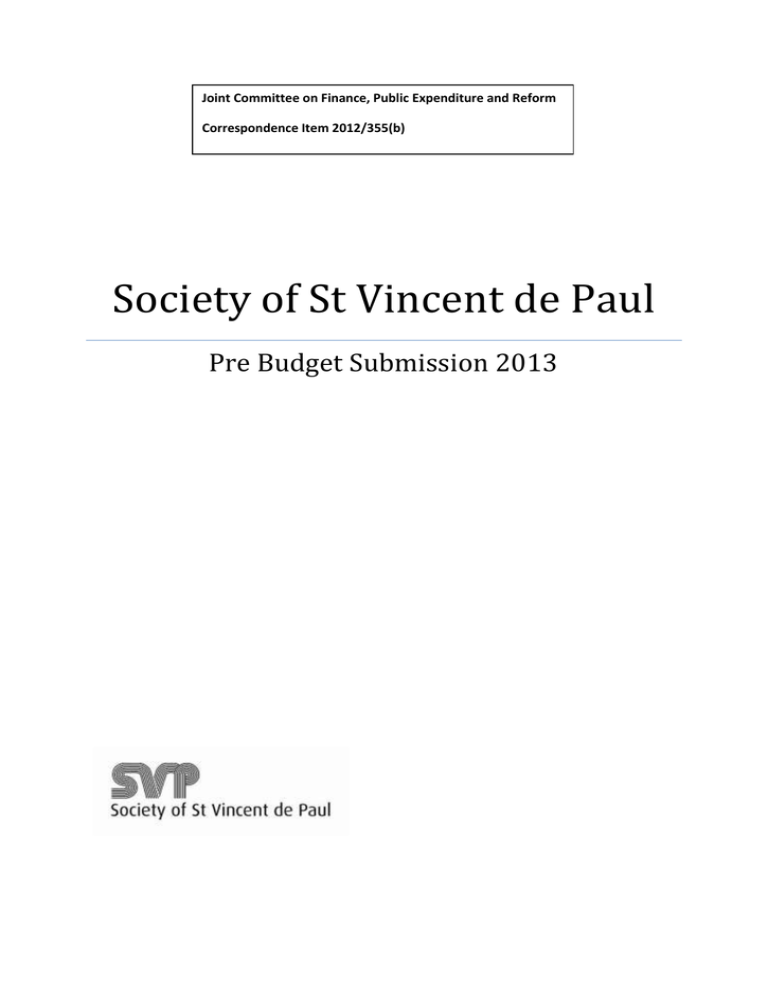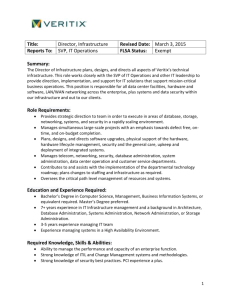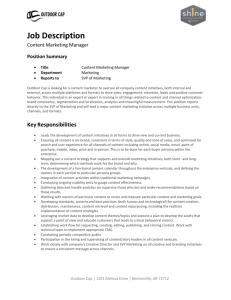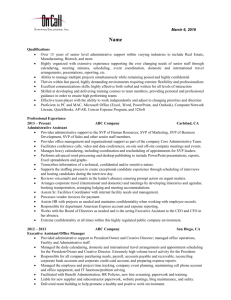Society of St Vincent de Paul
advertisement

Joint Committee on Finance, Public Expenditure and Reform Correspondence Item 2012/355(b) Society of St Vincent de Paul Pre Budget Submission 2013 Contents Introduction ....................................................................................................... 2 Summary of recommendations.......................................................................... 4 Department of Social Protection ........................................................................ 6 Department of Communications, Energy and Natural Resources .................... 10 Department of Health ...................................................................................... 11 Department of Education and Skills ................................................................. 14 Department of Finance .................................................................................... 16 Department of Public Expenditure and Reform ............................................... 17 For further information contact: Jim Walsh, 087 254 1700/01 661 3515 John Mark McCafferty, Head of Social Justice and Policy, 087 236 3995/01 838 6990 1|Page Introduction The Society of St Vincent de Paul sees at first hand the impact that the economic crisis has had on struggling households. Calls for assistance to the SVP’s largest regional offices have increased by over 80% since 2009. The impact of cutbacks to incomes and services has been most keenly felt by those least able to afford it, resulting in increased demand for our services. SVP is spending in excess of €70 million per annum providing assistance to individuals and families in need. Approximately half of this is spent on the provision of services such as homeless hostels, social housing, resource centres, crèches, youth clubs and holiday centres. The balance is provided as direct assistance to people in need. The SVP’s expenditure on cash assistance and help with the cost of energy and fuel to individuals and families in need has almost doubled since 2008. The SVP is spending over €7 million on food each year, and at least €5 million on education. On behalf of the people we assist and those who are struggling in Ireland today, SVP is challenging the unfair burden which has been placed upon those least able to afford it. We in the Society of St Vincent de Paul are challenged to action by the words of our principal founder, Blessed Frederic Ozanam (1813-1853) who said “You must not be content with tiding the poor over the poverty crisis: you must study their condition and the injustices which brought about such poverty, with the aim of a long term improvement”. Inspired by these words, the Society of St Vincent de Paul has three messages for government, the general public and for people who are struggling in Ireland. Those who have already borne the brunt of cutbacks and who are unable to take any more must be protected. To this end, Government must tackle the burden of the banking debt, reduce the non-core costs of providing public services and ensure that those who can afford it take more of the burden of the crisis on their shoulders. We appreciate that people who will be affected by this request may be generous donors to SVP, or may be SVP members, volunteering their time and talents to help people in need. But our request to Government is made so that those who are struggling to get by and have experienced deep cuts to income supports and services are protected from further cutbacks. Government must set out a road map for Irish society so that people are protected and can retain their hope and optimism for the future. This includes putting in place the conditions to encourage employment creation, for those out of work and for our young people. People’s well-being is being damaged as their need for diminishing state supports and services remains unmet. The people we meet speak about the struggle to make ends meet and the stress caused by trying to get by on a low income and cope with life events like unemployment, debt, relationship breakdown, disability, and loneliness. They also talk about the need to have hope for a better future. We must see a road map from Government for all of Irish society which ensures that individuals and families can live a life with dignity during this crisis and which reassures us that we are heading towards a positive future. To those who are struggling in Ireland today, the Society of St Vincent de Paul is standing with you. We know that many people, particularly those new to need, are facing their personal, financial or emotional crisis in isolation and feeling terribly alone. Please remember that you are not alone. If you are struggling with the mortgage on your home, you are one of over 170,000 households. If you 2|Page are using money lenders you are one of over 200,000 people. If you are behind on your energy bills remember that over 300,000 energy payment plans were made last year. If you are seeking employment you are with over 430,000 others. If you see yourself in the lives of the people described in this publication, the Society of St Vincent de Paul is standing with you. We encourage you to seek support knowing you are not alone. In spite of the rhetoric about protecting the most vulnerable, the reality is that severe hardships have been imposed on people with the lowest incomes and least resources. The SVP strongly urges Government to bear this in mind when formulating Budget 2013. 3|Page Summary of recommendations Department of Social Protection Individuals and families must have a sufficient income to afford a minimum essential standard of living Income supports for children must be protected The social welfare system must support and facilitate people’s ability to move between welfare and work by being responsive and flexible in the ways in which schemes are administered The social welfare system must support families in low paid employment, to prevent already pressurised households from falling deeper into poverty and hardship Interdepartmental work with the Department of Communications, Energy and Natural Resources and the Department of the Environment must gain momentum to tackle the issue of energy poverty through implementing the relevant key actions of the Warmer Homes Strategy. Department of Communications, Energy and Natural Resources Commit to making the necessary funding available for the Better Energy, Warmer Homes programme in 2013 and beyond. Department of Health Protect critical community public health services Deliver 99 Child and Adolescent Mental Health teams Maintain the Drugs Payment Scheme threshold at €132 per month Withdraw the 50 cent prescription charge for medical card holders Facilitate older people to remain at home as long as possible by maintaining supports such as Home Help and Home Care Packages Resource the Special Action Group on Obesity to enable it to achieve its brief No further cuts to often residual transport arrangements for patients living far from treatment centres Introduce minimum pricing for alcohol including a social responsibility levy and restore excise duties on alcohol to 2009 levels to yield €150 million a year and use this revenue to provide prevention initiatives and treatment in community settings 4|Page Department of Education and Skills Commit to protecting current levels of expenditure in areas which affect the most educationally disadvantaged. Educational e-books should not be priced at hard copy prices. Educational e-book digital content should not attract VAT at 23%. No further increase to school transport costs. Protect student support budget (student grants) at current level. Reconsider decision regarding allocation of Guidance Counsellors. Prioritise funding for upskilling teachers to improve literacy and numeracy of students, particularly in disadvantaged areas. Protect the School Completion Programme from further cuts. Protect NEPS funding from further cuts. End the situation where the children of non-EU migrant workers resident in Ireland for many years are excluded from accessing free fees and student supports for third level education. Department of Finance Government must ensure that the repayment of banking debt and the servicing of interest on the debt is not prioritised over the provision of essential income supports and services for the most vulnerable in Irish society. The ratio of expenditure cuts to tax increases in closing the budget deficit must be reversed, so that more emphasis is placed on increasing the tax take in a fair and progressive manner which does not create poverty or unemployment traps, nor worsen the situation of those in employment who are struggling to get by. Those on low incomes must be protected from further cuts or increases in taxation. Department of Public Expenditure and Reform Government should fulfil its commitment to eliminating waste, reducing non-core costs and improving efficiency in the public sector, to ensure that the needs of citizens and service user are met flexibly and efficiently The ratio of expenditure cuts to tax increase in closing the budget deficit must be reversed, so that more emphasis is placed on increasing the tax take in a fair and progressive manner which does not create poverty or unemployment traps, nor worsen the situation of those in employment who are struggling to get by. 5|Page Department of Social Protection SVP’s vision is for a social protection system which provides an adequate income and is accessible in a timely manner to people when they need it, avoids the creation of poverty and unemployment traps and which provides clear exit routes from welfare to employment, education or training, collaborating with SOLAS to provide the best quality service to all citizens. We have identified five principles which should inform Budget 2013 for the Department of Social Protection, based on the experiences of our members working with people in need: Individuals and families must have a sufficient income to live with dignity and to meet their minimum needs The Vincentian Partnership for Social Justice has carried out extensive work on a Minimum Income Standard for Ireland1. This study identifies the income necessary for a range of households to live a life with dignity. In order that this is possible there can be no further reduction to working age social welfare payments; and the social welfare system must continue to support families in low paid employment. We welcome the commitment in the Programme for Government to protect welfare rates. However, we also note that in Budget 2012, while basic rates were protected, some households suffered deep cuts to their incomes as a result of changes in the eligibility criteria for schemes such as Community Employment, and changes to the earnings disregard for the One Parent Family Payment. In addition to the protection of welfare rates, eligibility criteria for social welfare supports must not be eroded further. The means tests, earnings disregards, income disregards, the universality of child benefit, income limits/thresholds for payments such as FIS, BSCFA, conditions for retention of secondary benefits on taking up employment (e.g. medical card, fuel allowance), conditions for signing on for credits, contributions required for Jobseekers Benefit and the maximum time limit for receipt of Jobseekers Benefit should not be worsened. SVP members note with concern the proposal contained in the Comprehensive Review of Expenditure to remove the Qualified Child Increase from young people aged 19-22 in full time education. We strongly oppose this suggestion as the Qualified Child Increase is an important support for families trying to keep young people in education. The removal of Child Benefit from 18 year olds is causing difficulty for poorer families with young people aged 18 who are studying for their Leaving Certificate, who face the voluntary contributions, charges for mock exam papers and other costs associated with education. Removing the Qualified Child Increase from these families would serve to deepen these difficulties and create more barriers to remaining in education. SVP is opposed to the introduction of a Single Working Age Payment (SWAP) to replace meanstested working age social welfare payments at this time. Without the necessary supports and services, the SWAP will not improve the income adequacy of households reliant on social welfare and will worsen the income adequacy of those combining some income from employment with income from social welfare. 1 Collins, M., B. MacMahon, G. Weld & R. Thornton (2012) A Minimum Income Standard for Ireland. Dublin: The Policy Institute 6|Page Some older people living alone and only in receipt of the State Pension do not have an income adequate for a minimum essential standard of living. Any proposed changes to supports for older people must be considered in this context. The Living Alone Allowance should be used as a mechanism to target income supports to those older people living alone with no source of income other than the State Pension. The supports provided under the Household Benefits Package are especially valued by older people and should be protected, particularly for those on the lowest incomes. SVP research with older people found that the free travel pass is a valuable support, enabling older people to take part in activities and preventing them becoming isolated. The free travel scheme should be maintained for older people on a low income. The Habitual Residence Condition prevents many migrants from being able to access any income supports. SVP members encounter individuals and families who have been left destitute as a result of failing the HRC, or because of the long delays in the appeals process. Migrants who are awaiting a decision or appeal of the Habitual Residence Condition should have recourse to the Basic Supplementary Welfare Allowance payment during this time. The direct provision allowance for people seeking asylum of €19.10 per week and €9.60 per child has never been increased since its introduction in 1999, putting asylum seekers in deep poverty during the lengthy asylum process. This payment must be increased as an urgent and humanitarian matter. The social welfare system must support families in low paid employment An in-work income support for families in work on a low income is essential, in recognition of the fact that an income adequate to starve off poverty is not always available to family earners in the labour market. Family Income Supplement (FIS) is an in-work support which helps families in receipt of the payment to take up low paid employment without exposing their children to in-work poverty. Supporting parents to have an adequate income while in employment is essential in preventing and tackling child poverty and requires the significant support provided by a payment such as FIS. Parental employment, and particularly maternal employment is an important factor protecting children from poverty and deprivation. Any support for low paid workers must reward parental employment. The value of Family Income Supplement is that it rewards low paid work for the families who receive it and this is a vital feature of any in work income support payment. Income supports for children must be protected The at risk of poverty rate for persons living in households with children would increase from 18.7% to 38.6% without family related social transfer payments. The important role of family allowances in shielding individuals from poverty in households with children is clear. The households with children being helped by SVP cannot take any reduction in the level of child income support payments they receive as they do not currently have enough to meet their basic living costs. Children in families on low incomes (social welfare and low paid employment) are particularly vulnerable to cuts in child income supports. It is essential that children living in households dependent on social welfare or low paid employment suffer no further cuts in the total level of child income support they receive. The social welfare system must support people’s ability to move between welfare and work SVP is opposed to any further reduction in the earnings disregard for the One Parent Family Payment. The earnings disregard is a vital support for lone parents making the move from welfare to 7|Page work. SVP opposes any policies which put adults parenting alone under additional stress and financial hardship. The current conditions attached to receipt of Jobseekers Allowance will be difficult for many lone parents to meet. These conditions must be reviewed in light of the changes to eligibility for the One Parent Family Payment with the needs of and demands placed upon lone parents in mind. This includes the requirement to seek full time employment and the need to acknowledge that for lone parents, it may not be possible to be fully flexible with regard to location of employment or hours worked as this may clash with their caring responsibilities. The National Employment and Entitlements Service must be responsive to the needs of lone parents and others who are making the move from welfare to work. Improving the earnings potential of lone parents through education and training opportunities and the provision of affordable, accessible and quality childcare and after school care is important. However, the fact that lone parents must be both the main earner and the main carer for their families has to be recognised and supported. It is unacceptable to cease the payment of the One Parent Family Payment to lone parents once their child reaches the age of seven without putting in place the necessary childcare and afterschool care supports which will provide enriching opportunities to children and allow parents to access employment. An interdepartmental approach is required which maximises current capital assets (schools, community and private childcare settings) and which reconfigures departmental strategies dealing with pre and after school care of children. The importance of the relationship between contributing to the Social Insurance fund via PRSI and being able to access supports when affected by unemployment or illness has become clear to many SVP members during the economic crisis, as they encounter individuals who do not qualify for Jobseekers Allowance because they were self-employed. As such, SVP asks that a system is developed for the self-employed to opt in to making contributions towards Jobseekers Benefit. SVP is supportive of proposals to place responsibility for housing those assessed as having a housing need and in receipt of Rent Supplement for longer than 18 months with the housing authorities. The Rental Accommodation Scheme and the proposed Housing Assistance Programme are positive initiatives in this regard, removing the poverty traps associated with Rent Supplement. It is important that in any changeover, the needs of tenants rather than cost-saving are the key priority for the Department of Social Protection and the Department of Environment, Community and Local Government. Tackling energy poverty The work which is ongoing with regard to the implementation of the strategy for affordable energy in Ireland is welcome. Supports such as the fuel allowance and the household benefits package are a key part of the plan to tackle energy poverty, and a valued support to households struggling to manage the cost of energy, particularly in the context of price increases recently announced by Bord Gais. In 2011 approximately 400,000 payment plans were entered into by people struggling to meet the cost of energy. Almost 40,000 households are using prepayment/pay as you go meters and a further 22,000 are using older token meters. The Department of Social Protection must continue to 8|Page work with Department of Environment and Department of Communications, Energy and Natural Resources to implement an interdepartmental approach to tackling energy poverty. The Warmer Homes Strategy commits the Department to a review of energy related payments and schemes and to work with utilities and the CER to explore ways of sharing data on benefit receipt and energy use (key actions 14 and 15 respectively). 9|Page Department of Communications, Energy and Natural Resources In the context of increasing energy prices and cuts to social welfare rates and the fuel allowance, SVP believes that the Better Energy Warmer Homes Scheme is the most effective means of mitigating the effects of energy poverty on low income households. An area-based approach under the Better Energy Warmer Homes programme offers the potential to link local actors and realise multiple energy, health and social benefits. We understand that €20 million is required to fund the Better Energy Warmer Homes programme, and that €4 million of this is required to develop and implement an area based approach. We urge the Minister for Communications, Energy and Natural Resources to commit to making the necessary funding available for this valuable programme in 2013 and beyond. 10 | P a g e Department of Health Our vision for Ireland’s health system is one founded on the core principle of equal access to equal care for equal need. While very cognisant of the risk of the HSE ending the year with a deficit of €500 million we cannot accept the recent raft of cuts to critical services such as Home Help hours and Home Care Packages amounting in total to €12.5 million. The Society acknowledges the severe strain in the system. Despite and indeed because of this pressure we request that the protection of critical health services to those most vulnerable in our society, namely those with the least means to provide for their own care is prioritised. Inadequate access to critical community based services Even before recent cuts and rationing access to many key community health services such as ophthalmic, speech & language therapy, occupational therapy, audiology and orthodontic/dental treatment was problematic. This has now been exacerbated by the flight from private health insurance which is putting more pressure on the poorly resourced public health system. In some parts of the county waiting lists for vital health services, as listed above, are long and lengthening. This is unacceptable as timely intervention, diagnosis and treatment, particularly for children, is critical. Community public health services must be protected at a service level which allows those with most need to access them in a timely manner. SVP is particularly conscious of the need to continue to provide oral health services to medical card patients and their children. Prioritising the Primary Care Strategy It is widely accepted that since its inception the Primary Care Strategy has not been adequately prioritised and funded. Given the ongoing reforms regarding efficiencies and salary levels SVP asks that this critical strategy is protected and the promised teams and networks rolled out. Child & Adolescent Mental Health Given that adolescence is the period when 75% of mental health problems emerge it is worrying that almost a quarter of children and young people referred to Child and Adolescent Mental Health Services (CAMHS) waited for up to a year to be seen between October 2010 and September 2011. We request that the commitment to deliver 99 Child and Adolescent Mental Health teams be prioritised as the current status of 56 teams, not all with their full complement of professionals, falls far short of that. We also support the recommendation contained in the Interim Report of the Steering Group on the Review of the Mental Health Act that staffing of community services must be prioritised over staffing acute settings. Cost of health care We ask that the Drug Payment Scheme threshold remain at its current level of €132 a month at least for those on social welfare payments, low incomes or for those with a chronic condition. SVP knows that the current charge of 50 cent per item of prescription for medical card holders is causing problems for vulnerable people and ask that this charge be withdrawn for those with serious need as the consequences in lack of compliance with medication is more costly in the longer term. 11 | P a g e Services for Older People SVP notes with concern the recent further cut back of 600,000 home help hours on top of the previous rationing of 500,000 hours from this critical service earlier this year. We note with alarm the reduction of Home Care Packages by 200 a month which in total saves €12.5 million. We see this development as short sighted given that it is stated Government policy to facilitate older people to remain at home as long as possible. SVP asks that savings are found from less critical areas of the health budget, such as administration, travel & subsistence to protect vital core services which help vulnerable people retain their dignity and quality of life. Obesity The steep social gradient with regard to obesity in the Growing Up in Ireland Study which found that 1 in 4 nine year olds is overweight (19%) and obese (7%) is a huge concern for SVP as children from poorer households are much more likely to be overweight and obese than those from the higher socio-economic groups (33% Vs. 22%). Since primary care settings are where 95% of illness can be treated adequate resources must be invested to support the detection and treatment of obesity and General Practitioners, in particular, must be incentivised to detect and treat obesity as early as possible. The Special Action Group on Obesity has a critical role to play and we ask that resources are ringfenced to protect its budget and ability to achieve the outcomes it has set itself. The publication of the revised food pyramid and Healthy Eating Guidelines for Children by the Department of Health is a welcome development. Close cooperation between the Department of Education and the Department of Social Protection, which runs the School Meals Scheme, is needed, at little cost, to ensure that these guidelines are widely disseminated to schools and community groups. This will improve awareness of what constitutes a healthy diet and an adequate portion size depending on age, gender and lifestyle with obvious and long term benefits in diet and health status. Travelling for treatment SVP volunteers across the country are involved in various local initiatives to help patients travel to and from hospitals for treatment. While we understand that cost cutting is paramount we must insist that serious consideration is given before further cuts are made to often residual transport arrangements for those living far from the location of their care as this causes severe hardship and stress. Access to specialist care Ireland continues to have lower than European average ratios for consultants per capita for many specialisms (neurology, urology, orthopaedic etc) with obvious impacts on those waiting for diagnosis and treatment. We applaud the recent reforms to consultant contracts. We hope that the improved efficiencies from increased consultant cover will result in improvements in both health outcomes and numbers treated. We hope this success will continue to other HSE disciplines with improvements in patient throughput and more responsive and flexible service delivery. 12 | P a g e Alcohol abuse Coping with alcohol-related harm costs the health service an estimated €1.2 billion a year - one twelfth of the health budget - and takes up 2,000 hospital beds a night. SVP supports minimum pricing for alcohol including a social responsibility levy. Restoring excise duties on alcohol to 2009 levels would yield €150 million a year, which could be channelled towards prevention initiatives and treatment and support services for individuals, children, families and communities. 13 | P a g e Department of Education and Skills The Society is now receiving more calls for assistance than ever before, up by over 80% our largest offices since 2009. We witness the humiliation and sense of exclusion felt by those who cannot afford school books, trips, equipment, uniforms and later on the costs associated with third level study and further education. Our members work hard to support and convince students and their families of the value of gaining a qualification. Early school leaving continues to be a blight, particularly for children in disadvantaged households. While this is a complex problem with many variables SVP knows that the cost of participation in school plays a huge part in making it difficult for parents to keep children in education. The Society recognises that the changed economic circumstances have placed significant pressure on exchequer spending and that the Department of Education and Skills is subject to an expenditure ceiling of €8,525 million in 2013, reducing further to €8,453 million in 2014. However Ireland’s investment in primary and second level education is near the bottom of the OECD table and investment in the early years sector had only begun to emerge from a residual level before the economic slow-down took hold. We ask you therefore to commit to protecting current levels of expenditure in areas which affect the most educationally disadvantaged. SVP waits to see how the Department will progress the book rental scheme issue after our successful campaign to make schemes more widely available and to stop frequent book edition changes. We know that ebooks and tablets are emerging as the preferred channel for educational materials at second level. We are fearful that a digital divide will impact negatively on those parents who cannot afford both hardware and digital content. SVP wants to see the Department of Education taking a strong leadership role in this emerging sector and taking steps to ensure that educational ebooks are not allowed to be priced at hard copy prices. Additionally, educational ebook digital content should not attract VAT at 23%. While SVP welcomes the reform of the Junior Certificate we are concerned that changes to the curriculum will result in more edition changes contrary to the publishers’ code and urge the Department to take proactive steps to prevent this happening. SVP notes the increase in cost of the School Transport Scheme for rural families and urges no further increases as these various school participating costs are unsustainable for families on low incomes. SVP welcomes the recent launch of SUSI the Student Universal Support Ireland which streamlines the administration of student maintenance grants for new students. Supporting low income students to begin or to return to third level and further education has been a core activity of our organisation for decades. We continue to see struggling families just above the current maintenance grant levels who simply cannot afford the participation costs drop out and lost the opportunity of an education. We support the Minister’s efforts to develop more equitable ways of ensuring that those who need to financial support get it and urge you to protect the student support budget at its current level. While SVP acknowledges that some of the legacy posts in schools (pre DEIS) have been saved we remain concerned at the reduction in teacher numbers and in particular in the move to appoint guidance counsellors from the general allocation of teachers. Asking schools to manage their 14 | P a g e guidance counselling from within the standard allocation of teachers means that in reality principals have to decide between reducing guidance hours for students or dropping subjects from the curriculum with the subsequent negative impact for students. We ask that the Minister reconsiders this decision regarding the allocation of Guidance Counsellors given their critical role in the lives of young students. SVP supports the national Literacy and Numeracy strategy and urges the Minister to prioritise funding to ensure that adequate provision is made to upskill new and current teachers so they can achieve the improvements in student learning outcomes needed, particularly in areas serving disadvantaged communities. SVP is keenly aware of the cuts to programmes such as the School Completion Programme which is a very valuable student and community facing initiative responding flexibly and creatively to local education needs. It also plays an important role in combating early school leaving. SVP asks that the School Completion Programme is protected from further cuts. The chronic underfunding of the National Educational Psychological Service (NEPS) has impacted negatively on those children who cannot afford the cost of private specialist care to treat their disorders which adversely affects their educational progress. NEPS funding must be protected from any further cuts. SVP notes the worrying statistic that one in four nine year olds in Ireland is overweight or obese. Children from poorer households (semi and unskilled manual households) are much more likely to be overweight or obese (29% of boys and 38% of girls) than their peers in professional households (19% of boys and 18% of girls). As a cost-neutral measure to tackle childhood obesity we ask that the recently published healthy eating guidelines for school children are disseminated to all schools. We also ask that the Department addresses the issue of poor school facilities, as currently some primary schools cannot meet the minimum time allocation for PE due to a lack of facilities and resources making PE more weather dependent. The situation where the children of non-EU migrants resident in Ireland for many years are unable to access the third level free fees scheme and student supports must be addressed. This situation has arisen as a result of an administrative oversight in the criteria for accessing third level student supports and can easily be reversed, making a huge difference to the families affected. We ask that you update the criteria for accessing financial assistance and introduce a standardised residence period (for example 3 years) so that the children of non EU migrants resident in Ireland for many years can access supports for third level education and free fees on the same basis as their Irish classmates. 15 | P a g e Department of Finance Figures from the Central Statistics Office reveal that between 2009 and 2010, those in the lowest income decile have experienced a decrease in equivalised disposable income of more than 26 per cent, while those in the highest income decile experienced an increase in income of more than 8 per cent. Over 700,000 people in Ireland are living in poverty. The unequal impact of the economic crisis is clear. SVP believes Ireland needs a major shift in the banking debt burden which has been imposed in an unfair and unsustainable way on those who are not responsible for it. A situation where the repayment of banking debt and the cost of servicing the debt is prioritised over the provision of essential income supports and services for the most vulnerable in Irish society is unacceptable to the Society of St Vincent de Paul. As part of the measures being taken in Budget 2013 and beyond, Government should make good on its commitment to reduce the non-core costs of delivering public services by eliminating waste and tackling inefficiencies so that we get better value for public expenditure and citizens and service users can receive the services they need and expect. We are aware that Government needs to reduce the gap between revenue and expenditure, with a total adjustment of €3.5 billion planned for Budget 2013. However, by reducing the burden of banking debt and delivering efficiencies in the delivery of public services, we believe the amount of the adjustment would be lessened for Budget 2013. In bridging the gap between Government revenue and expenditure - having delivered on non-core cost improvements and a reduction in the debt burden - the Society of St Vincent de Paul believes that vulnerable people would be better protected if the Government ensured that those with higher incomes and assets take more of the burden of the crisis on their shoulders so that the public services and supports relied on by those with low incomes and high outgoings on necessities are protected. Our priorities for the Department of Finance in Budget 2013 are as follows: Government must ensure that the repayment of banking debt and the servicing of interest on the debt is not prioritised over the provision of essential income supports and services for the most vulnerable in Irish society. The ratio of expenditure cuts to tax increase in closing the budget deficit must be reversed, so that more emphasis is placed on increasing the tax take in a fair and progressive manner which does not create poverty or unemployment traps, nor worsen the situation of those in employment who are struggling to get by. Those on low incomes must be protected from further cuts or increases in taxation. 16 | P a g e Department of Public Expenditure and Reform Our priorities for the Department of Public Expenditure & Reform for Budget 2013 are as follows: Government should fulfil its commitment to eliminating waste, reducing non-core costs and improving efficiency in the public sector, to ensure that the needs of citizens and service user are met flexibly and efficiently The ratio of expenditure cuts to tax increase in closing the budget deficit must be reversed, so that more emphasis is placed on increasing the tax take in a fair and progressive manner which does not create poverty or unemployment traps, nor worsen the situation of those in employment who are struggling to get by. 17 | P a g e








